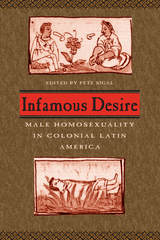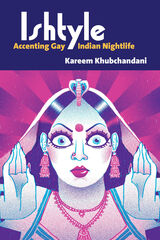117 books about Gay men and 5
start with I
117 books about Gay men and 5
117 books about Gay men
5 start with I start with I
5 start with I start with I

In Changing Times
Gay Men and Lesbians Encounter HIV/AIDS
Edited by Martin P. Levine, Peter M. Nardi, and John H. Gagnon
University of Chicago Press, 1997
The HIV/AIDS epidemic has been a major catastrophe for gay communities. In less than two decades, the disease has profoundly changed the lives of gay men and lesbians. Not just a biological and viral agent, HIV has become an opportunistic social invader, reshaping communities and the distribution of wealth, altering the social careers of gay professionals and the patterns of entry into gay and lesbian life, and giving birth to groups like ACT UP and Queer Nation.
The distinguished contributors to this volume discuss the ways HIV/AIDS has changed collective and individual identities, as well as lives, of gay men and lesbians, and how these alterations have changed our perceptions of the epidemic. They cover such topics as the impact of the epidemic on small towns, cultural barriers to AIDS prevention, gay youth and intergenerational relations, and the roles of lesbians in AIDS organizations. This collection provides compelling insights into the new communities among gay men and lesbians and the new kinds of identities and relationships that are emerging from the social and cultural ferment engendered by HIV/AIDS.
Contributors include Barry D. Adam, Lourdes Arguelles, Rafael Miguel Diaz, John H. Gagnon, Gilbert Herdt, Gregory M. Herek, Nan D. Hunter, Peter M. Nardi, John L. Peterson, Anne Rivero, Gayle S. Rubin, Beth E. Schneider, and Nancy E. Stoller.
The distinguished contributors to this volume discuss the ways HIV/AIDS has changed collective and individual identities, as well as lives, of gay men and lesbians, and how these alterations have changed our perceptions of the epidemic. They cover such topics as the impact of the epidemic on small towns, cultural barriers to AIDS prevention, gay youth and intergenerational relations, and the roles of lesbians in AIDS organizations. This collection provides compelling insights into the new communities among gay men and lesbians and the new kinds of identities and relationships that are emerging from the social and cultural ferment engendered by HIV/AIDS.
Contributors include Barry D. Adam, Lourdes Arguelles, Rafael Miguel Diaz, John H. Gagnon, Gilbert Herdt, Gregory M. Herek, Nan D. Hunter, Peter M. Nardi, John L. Peterson, Anne Rivero, Gayle S. Rubin, Beth E. Schneider, and Nancy E. Stoller.
[more]

In the Province of the Gods
Kenny Fries
University of Wisconsin Press, 2021
Kenny Fries embarks on a journey of profound self-discovery as a disabled foreigner in Japan, a society historically hostile to difference. As he visits gardens, experiences Noh and butoh, and meets artists and scholars, he also discovers disabled gods, one-eyed samurai, blind chanting priests, and A-bomb survivors. When he is diagnosed as HIV positive, all his assumptions about Japan, the body, and mortality are shaken, and he must find a way to reenter life on new terms.
[more]

In the Shadow of the Epidemic
Being HIV-Negative in the Age of AIDS
Walt Odets
Duke University Press, 1995
For gay men who are HIV-negative in a community devastated by AIDS, survival may be a matter of grief, guilt, anxiety, and isolation. In the Shadow of the Epidemic is a passionate and intimate look at the emotional and psychological impact of AIDS on the lives of the survivors of the epidemic, those who must face on a regular basis the death of friends and, in some cases, the decimation of their communities. Drawing upon his own experience as a clinical psychologist and a decade-long involvement with AIDS/HIV issues, Walt Odets explores the largely unrecognized matters of denial, depression, and identity that mark the experience of uninfected gay men.
Odets calls attention to the dire need to address issues that are affecting HIV-negative individuals—from concerns about sexuality and relations with those who are HIV-positive to universal questions about the nature and meaning of survival in the midst of disease. He argues that such action, while explicitly not directing attention away from the needs of those with AIDS, is essential to the human and biological well-being of gay communities. In the immensely powerful firsthand words of gay men living in a semiprivate holocaust, the need for a broader, compassionate approach to all of the AIDS epidemic’s victims becomes clear. In the Shadow of the Epidemic is a pathbreaking first step toward meeting that need.
Odets calls attention to the dire need to address issues that are affecting HIV-negative individuals—from concerns about sexuality and relations with those who are HIV-positive to universal questions about the nature and meaning of survival in the midst of disease. He argues that such action, while explicitly not directing attention away from the needs of those with AIDS, is essential to the human and biological well-being of gay communities. In the immensely powerful firsthand words of gay men living in a semiprivate holocaust, the need for a broader, compassionate approach to all of the AIDS epidemic’s victims becomes clear. In the Shadow of the Epidemic is a pathbreaking first step toward meeting that need.
[more]

Infamous Desire
Male Homosexuality in Colonial Latin America
Edited by Pete Sigal
University of Chicago Press, 2003
What did it mean to be a man in colonial Latin America? More specifically, what did indigenous and Iberian groups think of men who had sexual relations with other men? Providing comprehensive analyses of how male homosexualities were represented in areas under Portuguese and Spanish control, Infamous Desire is the first book-length attempt to answer such questions. In a study that will be indispensable for anyone studying sexuality and gender in colonial Latin America, an esteemed group of contributors view sodomy through the lens of desire and power, relating male homosexual behavior to broader gender systems that defined masculinity and femininity.
[more]

Ishtyle
Accenting Gay Indian Nightlife
Kareem Khubchandani
University of Michigan Press, 2020
Ishtyle follows queer South Asian men across borders into gay neighborhoods, nightclubs, bars, and house parties in Bangalore and Chicago. Bringing the cultural practices they are most familiar with into these spaces, these men accent the aesthetics of nightlife cultures through performance. Kareem Khubchandani develops the notion of “ishtyle” to name this accented style, while also showing how brown bodies inadvertently become accents themselves, ornamental inclusions in the racialized grammar of desire. Ishtyle allows us to reimagine a global class perpetually represented as docile and desexualized workers caught in the web of global capitalism. The book highlights a different kind of labor, the embodied work these men do to feel queer and sexy together. Engaging major themes in queer studies, Khubchandani explains how his interlocutors’ performances stage relationships between: colonial law and public sexuality; film divas and queer fans; and race, caste, and desire. Ultimately, the book demonstrates that the unlikely site of nightlife can be a productive venue for the study of global politics and its institutional hierarchies.
[more]
READERS
Browse our collection.
PUBLISHERS
See BiblioVault's publisher services.
STUDENT SERVICES
Files for college accessibility offices.
UChicago Accessibility Resources
home | accessibility | search | about | contact us
BiblioVault ® 2001 - 2024
The University of Chicago Press









